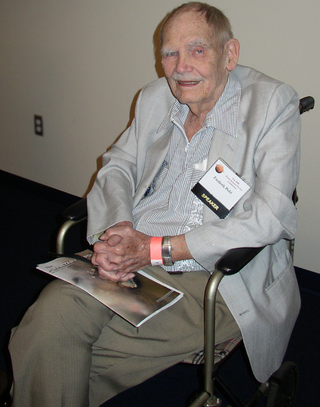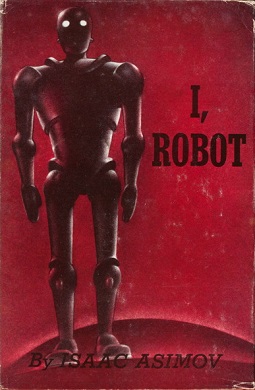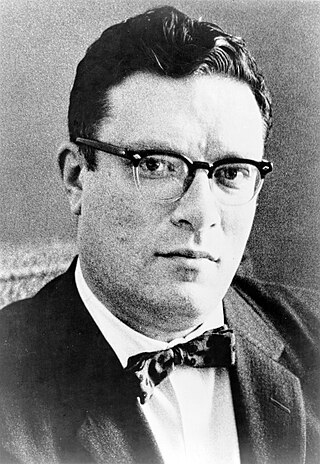Isaac Asimov (1920–1992) was a writer.
Asimov may also refer to:
Isaac Asimov (1920–1992) was a writer.
Asimov may also refer to:

Frederik George Pohl Jr. was an American science-fiction writer, editor, and fan, with a career spanning nearly 75 years—from his first published work, the 1937 poem "Elegy to a Dead Satellite: Luna", to the 2011 novel All the Lives He Led.

I, Robot is a fixup collection made up of science fiction short stories by American writer Isaac Asimov. The stories originally appeared in the American magazines Super Science Stories and Astounding Science Fiction between 1940 and 1950 and were then collected into a 1950 publication Gnome Press in 1950, in an initial edition of 5,000 copies.

Isaac Asimov was an American writer and professor of biochemistry at Boston University. During his lifetime, Asimov was considered one of the "Big Three" science fiction writers, along with Robert A. Heinlein and Arthur C. Clarke. A prolific writer, he wrote or edited more than 500 books. He also wrote an estimated 90,000 letters and postcards. Best known for his hard science fiction, Asimov also wrote mysteries and fantasy, as well as much non-fiction.

John Wood Campbell Jr. was an American science fiction writer and editor. He was editor of Astounding Science Fiction from late 1937 until his death and was part of the Golden Age of Science Fiction. Campbell wrote super-science space opera under his own name and stories under his primary pseudonym, Don A. Stuart. Campbell also used the pen names Karl Van Kampen and Arthur McCann. His novella Who Goes There? was adapted as the films The Thing from Another World (1951), The Thing (1982), and The Thing (2011).

The Foundation series is a science fiction book series written by American author Isaac Asimov. First published as a series of short stories and novellas in 1942–50, and subsequently in three collections in 1951–53, for nearly thirty years the series was a trilogy: Foundation; Foundation and Empire; and Second Foundation. It won the one-time Hugo Award for "Best All-Time Series" in 1966. Asimov later added new volumes, with two sequels: Foundation's Edge and Foundation and Earth, and two prequels: Prelude to Foundation and Forward the Foundation.

Janet Opal Asimov, usually written as J. O. Jeppson, was an American science fiction writer, psychiatrist, and psychoanalyst.

Gardner Raymond Dozois was an American science fiction author and editor. He was the founding editor of The Year's Best Science Fiction anthologies (1984–2018) and was editor of Asimov's Science Fiction magazine (1986–2004), garnering multiple Hugo and Locus Awards for those works almost every year. He also won the Nebula Award for Best Short Story twice. He was inducted to the Science Fiction Hall of Fame on June 25, 2011.

Asimov's Science Fiction is an American science fiction magazine published by Penny Press and edited by Sheila Williams. It was launched as a quarterly by Davis Publications in 1977, after obtaining Isaac Asimov's consent for the use of his name. It was originally titled Isaac Asimov's Science Fiction Magazine, and was quickly successful, reaching a circulation of over 100,000 within a year, and switching to monthly publication within a couple of years. George H. Scithers, the first editor, published many new writers who went on to be successful in the genre. Scithers favored traditional stories without sex or obscenity; along with frequent humorous stories this gave Asimov's a reputation for printing juvenile fiction, despite its success. Asimov was not part of the editorial team, but wrote editorials for the magazine.

Stanley Grauman Weinbaum was an American science fiction writer. His first story, "A Martian Odyssey", was published to great acclaim in July 1934; the alien Tweel was arguably the first character to satisfy John W. Campbell's challenge: "Write me a creature who thinks as well as a man, or better than a man, but not like a man." Weinbaum wrote more short stories and a few novels, but died from lung cancer less than a year and a half later.
George H. Scithers was an American science fiction fan, author and editor.
Shawna Lee McCarthy is an American science fiction and fantasy editor and literary agent.

A science fiction magazine is a publication that offers primarily science fiction, either in a hard-copy periodical format or on the Internet. Science fiction magazines traditionally featured speculative fiction in short story, novelette, novella or novel form, a format that continues into the present day. Many also contain editorials, book reviews or articles, and some also include stories in the fantasy and horror genres.
The Golden Age of Science Fiction, often identified in the United States as the years 1938–1946, was a period in which a number of foundational works of science fiction literature appeared. In the history of science fiction, the Golden Age follows the "pulp era" of the 1920s and 1930s, and precedes New Wave science fiction of the 1960s and 1970s. The 1950s are, in this scheme, a transitional period. Robert Silverberg, who came of age in the 1950s, saw that decade as the true Golden Age. According to historian Adam Roberts, "the phrase Golden Age valorises a particular sort of writing: 'Hard SF', linear narratives, heroes solving problems or countering threats in a space-opera or technological-adventure idiom."

Sheila Williams is the editor of Asimov's Science Fiction magazine.
Four distinct awards have been named for writer, chemist, and humanist Isaac Asimov.
William F. Wu is a Chinese-American science fiction, fantasy, and crime author.

The Jaguar Hunter is a collection of science fiction, fantasy and horror stories by American author Lucius Shepard. Illustrated by J. K. Potter, it was released in May, 1987 and was the author's first book published by Arkham House. It was originally published in an edition of 3,194 copies, with a second printing later in 1987 of 1,508 copies. Bantam Books issued a trade paperback edition in 1989, and Four Walls Eight Windows reprinted the collection in 2001. The first British publication came as a Paladin Books trade paperback in 1988, followed quickly by a Kerosina Books hardcover. A Rumanian translation appeared in 2008.

Asimov Crater is an impact crater in the Noachis quadrangle of Mars, located at 47.0° S and 355.05° W. It is 84.0 km (52.2 mi) in diameter and was named after Isaac Asimov (1920–1992), an American biochemist and writer. The name was officially adopted on May 4, 2009.
This is a bibliography of American science fiction author Kim Stanley Robinson.
Isaac Asimov wrote three volumes of autobiography. In Memory Yet Green (1979) and In Joy Still Felt (1980) were a two-volume work, covering his life up to 1978. The third volume, I. Asimov: A Memoir (1994), published after his death, was not a sequel but a new work which covered his whole life. This third book won a Hugo Award.